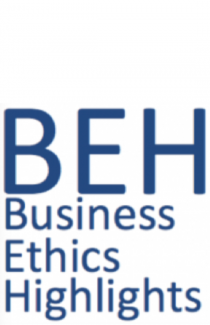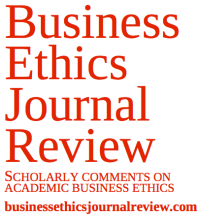by Chris MacDonald*
Here’s what journalists need to know about interviewing experts in the field of business ethics and corporate social responsibility:
1. Almost every story about business has an ethics angle. Ethics is about how people should constrain their behaviour in pursuit of self-interest, and about how businesses should constrain their actions in pursuit of profit. Most typically, ethics requires that we avoid doing harm, and avoid violating people’s rights. The vast majority of business decisions have implications either for people’s well-being or for their rights. So just about every business decision has an ethical component. For example, a product design and labelling decisions can have environmental implications, which are always a matter of ethics. (You can see my definition of ethics here: ethics definition.)
2. An ethics expert (e.g., a professor who teaches ethics) will tend to know a lot about the arguments for and against, but will typically not have an opinion on various factual matters (e.g., “Is this sort of thing common?” and “How many companies have done this?” and “Will this continue in the future?”). However, within their own narrow field of teaching and research expertise, they will be more well-informed than the usual person (e.g., a prof who teaches ethics in finance will tend to know about financial institutions, key issues, etc.)
3. An ethics expert (e.g., a professor who teaches ethics) will typically resist giving you a straight “yes or no” answer to a question like, “Is this unethical?” They are very likely, however, to be helpful in pointing out the strengths and weaknesses of various points of view (whether they are, e.g., factually misinformed or based on faulty logic). They may tell you that on a particular issue there are several respectable (but possibly contradictory) answers, but also several unreasonable answers.
4. Most ethics experts will be better at helping you see what the key questions are than they are at giving answers to those questions.
5. Ethics and the law are not the same thing. Some things are legal but unethical. Some illegal things are ethically justifiable in certain circumstances. Ethics experts are not automatically legal experts, though they may tend to be familiar with basic legal issues that intersect with their own areas of teaching and research.
6. Ethics is a true area of expertise, but expertise in the area is contentious. Look for credentials. Having a PhD focusing on ethics is good. Teaching the topic at a respected university is also good. Some people’s jobs — for example, being in charge of training your company’s employees on its Code of Ethics — give them experience and expertise in particular bits of ethics, but not necessarily broader competency.
7. Being an expert in ethics is not the same as being a moral authority. Ethics professors, for example, are not necessarily more ethical than anyone else. They don’t have special access to the right answers. However, they do tend to know a lot about the ins and outs of ethical reasoning, and typically have a good sense of what the “standard” issues and arguments are with regard to certain ethical questions.
8. Being a moral authority (in the eyes of some group) doesn’t make someone an expert on ethics. A priest for example may know the moral teachings of his or her religion, but may or may not be an expert at critically assessing the application of those teachings to specific moral issues. Their authority also tends to be limited to their own moral/religious tradition. On the other hand, some clerics do have additional training in ethics specifically.
9. Related fields of expertise include law, governance, and compliance. Each of those overlaps with ethics in important ways, but the overlap is always incomplete. (For example: governance experts will know about the hard problems related to executive compensation. But they may or may not know about the ethical issues — for example, questions of social justice — that remain once regulations and “best practice” are satisfied.)
10. The vocabulary related to business ethics (i.e., doing the right thing in commerce) is complex. People tend to use a range of different terms in talking about this topic, or parts of it. For example, some talk about Corporate Social Responsibility. Others talk about corporate citizenship. Others think in terms of sustainability or human rights. For guidance, see: “‘Doing the right thing:’ A brief guide to the jargon”
 Chris MacDonald, Ph.D., is co-editor of Business Ethics Highlights, and co-author of Business Ethics: Decision Making for Personal Integrity & Social Responsibility. He has a doctorate in Philosophy, specializing in ethics. He has taught ethics in philosophy departments and business schools for the last 15 years. MacDonald is also author of the highly-regarded Business Ethics Blog. He has several times been named as one of the “100 Most Influential People in Business Ethics,” by Ethisphere Magazine, in addition to being named as one of the “Top 100 Thought Leaders in Trustworthy Business Behaviour” By Trust Across America. He is frequently sought out by local and national news media for expert commentary on ethical issues.
Chris MacDonald, Ph.D., is co-editor of Business Ethics Highlights, and co-author of Business Ethics: Decision Making for Personal Integrity & Social Responsibility. He has a doctorate in Philosophy, specializing in ethics. He has taught ethics in philosophy departments and business schools for the last 15 years. MacDonald is also author of the highly-regarded Business Ethics Blog. He has several times been named as one of the “100 Most Influential People in Business Ethics,” by Ethisphere Magazine, in addition to being named as one of the “Top 100 Thought Leaders in Trustworthy Business Behaviour” By Trust Across America. He is frequently sought out by local and national news media for expert commentary on ethical issues.



Pingback: Journalists and Ethics Experts | The Business Ethics Blog
Chris this is a great initiative and one that facilities both journalists and the business ethicists. Often it is difficult for anyone studying the abstract moral aspects of business practices to convincing communicate what we do and what is valuable about what we do. I have taught business ethics for 20 years and I often introduce new students to the class with the humorous, yet daunting, confession “I’m terrible at teaching this course!” The reason? I have never been able to nuance, let alone change, students’ conviction that “business ethics is an oxymoron”.
Excellent points Chris, respectfully, I would like to explore if Isaac Levi’s denial of the (commonplace) assumption that in making ethical decisions agents often have to juggle competing values, and that no choice will maximize satisfaction of them all, but instead arguing that agents often must choose without having balanced their different values and that to be rational, ethically or otherwise, an act does not have to be optimal, only what Levi terms “admissible”: which is a problem for ‘moral Bayesianism’, and hence to business ethics: and it is precisely businesses that are most likely to take advantage of such a ‘loophole’, which Thomas Pogge generalizes to show that even the most well-Intentioned organizations and businesses can and do act in ethically harmful ways without having to face ethical consequences, sincerely, George!
Hello, I am a student at a University in Missouri and am currently enrolled in an Ethics in Human communications class. I found this post to be very helpful when understanding ethics, especially in journalists and other ethics experts. Much like we have learned in class, you mentioned that ethics requires that we avoid doing harm and avoid violating people’s rights. I found the part where you said that an ethics expert would typically resist giving a straight yes or no answer to the question, “is this ethical?” These people are more than likely deep thinkers, and know many different perspectives, much like the ones I have learned about in class, that they can use when deciding if something is ethical. Number 4, however, leaves me with some questions. Why is it that most ethics experts will be better at helping you see what the key questions are than they would be at giving the answers to the questions? My favorite part of this post was the comment that ethics and the law are not the same thing. Different people have different opinions of what it ethical and what is not. Mostly because these things are based on opinion and morals. The law is set in stone, so-to-speak. The textbook we use in class matches several of the points made in this post. When discussing the difference between ethics and morals, “Ethics denotes the general and systematic study of what ought to be the grounds and principles for right and wrong human behavior.” (Ethics in Communication).
Johannesen, R., Valde, K. & Whedbee, K. (2008) Ethics in Communication (6th Ed.) Waveland Press, Inc.